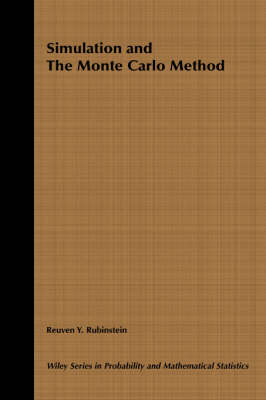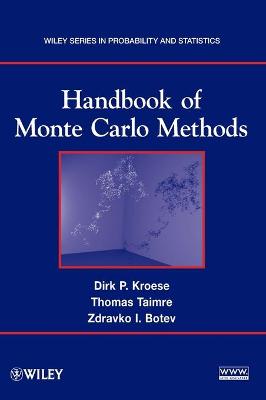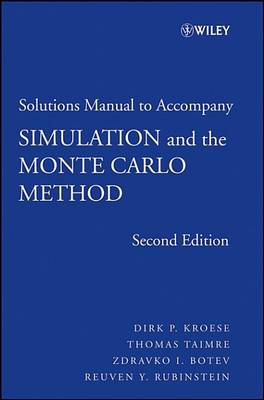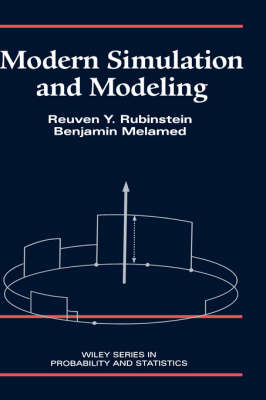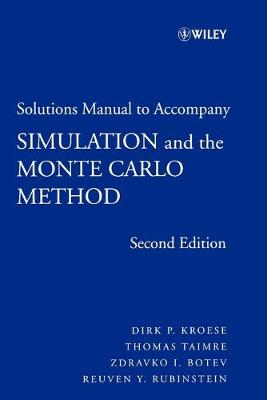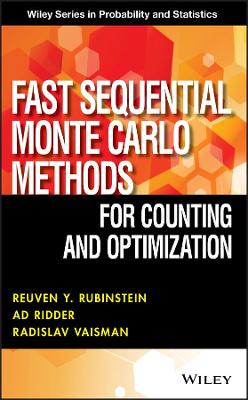Wiley Series in Probability and Statistics
3 primary works • 6 total works
Book 190
This book provides the first simultaneous coverage of the statistical aspects of simulation and Monte Carlo methods, their commonalities and their differences for the solution of a wide spectrum of engineering and scientific problems. It contains standard material usually considered in Monte Carlo simulation as well as new material such as variance reduction techniques, regenerative simulation, and Monte Carlo optimization.
Book 706
Handbook for Monte Carlo Methods
by Dirk P. Kroese, Thomas Taimre, and Zdravko I. Botev
Published 1 January 2011
A comprehensive overview of Monte Carlo simulation that explores the latest topics, techniques, and real-world applications More and more of today s numerical problems found in engineering and finance are solved through Monte Carlo methods. The heightened popularity of these methods and their continuing development makes it important for researchers to have a comprehensive understanding of the Monte Carlo approach. Handbook of Monte Carlo Methods provides the theory, algorithms, and applications that helps provide a thorough understanding of the emerging dynamics of this rapidly-growing field. The authors begin with a discussion of fundamentals such as how to generate random numbers on a computer.
Subsequent chapters discuss key Monte Carlo topics and methods, including: * Random variable and stochastic process generation * Markov chain Monte Carlo, featuring key algorithms such as the Metropolis-Hastings method, the Gibbs sampler, and hit-and-run * Discrete-event simulation * Techniques for the statistical analysis of simulation data including the delta method, steady-state estimation, and kernel density estimation * Variance reduction, including importance sampling, latin hypercube sampling, and conditional Monte Carlo * Estimation of derivatives and sensitivity analysis * Advanced topics including cross-entropy, rare events, kernel density estimation, quasi Monte Carlo, particle systems, and randomized optimization The presented theoretical concepts are illustrated with worked examples that use MATLAB(R), a related Web site houses the MATLAB(R) code, allowing readers to work hands-on with the material and also features the author's own lecture notes on Monte Carlo methods.
Detailed appendices provide background material on probability theory, stochastic processes, and mathematical statistics as well as the key optimization concepts and techniques that are relevant to Monte Carlo simulation. Handbook of Monte Carlo Methods is an excellent reference for applied statisticians and practitioners working in the fields of engineering and finance who use or would like to learn how to use Monte Carlo in their research. It is also a suitable supplement for courses on Monte Carlo methods and computational statistics at the upper-undergraduate and graduate levels.
Subsequent chapters discuss key Monte Carlo topics and methods, including: * Random variable and stochastic process generation * Markov chain Monte Carlo, featuring key algorithms such as the Metropolis-Hastings method, the Gibbs sampler, and hit-and-run * Discrete-event simulation * Techniques for the statistical analysis of simulation data including the delta method, steady-state estimation, and kernel density estimation * Variance reduction, including importance sampling, latin hypercube sampling, and conditional Monte Carlo * Estimation of derivatives and sensitivity analysis * Advanced topics including cross-entropy, rare events, kernel density estimation, quasi Monte Carlo, particle systems, and randomized optimization The presented theoretical concepts are illustrated with worked examples that use MATLAB(R), a related Web site houses the MATLAB(R) code, allowing readers to work hands-on with the material and also features the author's own lecture notes on Monte Carlo methods.
Detailed appendices provide background material on probability theory, stochastic processes, and mathematical statistics as well as the key optimization concepts and techniques that are relevant to Monte Carlo simulation. Handbook of Monte Carlo Methods is an excellent reference for applied statisticians and practitioners working in the fields of engineering and finance who use or would like to learn how to use Monte Carlo in their research. It is also a suitable supplement for courses on Monte Carlo methods and computational statistics at the upper-undergraduate and graduate levels.
Book 732
A step-by-step guide for today's modeling and simulation practices This new guide for modeling and simulation of discrete-event systems (DES) demonstrates why simulation is fast becoming the method of choice for the evaluation of system performance in science, engineering, and management. The book begins with the basics of conventional simulation, then proceeds to modern simulation-treating sensitivity analysis and optimization in a wide range of systems that exhibit complex interaction of discrete events. These include communications networks, flexible manufacturing systems, PERT (project evaluation and review techniques) networks, queueing systems, and more.
Less focused on theory than on presenting a clear approach to practical applications, Modern Simulation and Modeling: Emphasizes concepts rather than mathematical completeness Integrates references and explanations of complex topics into the body of the text Provides an innovative chapter on rare-event probability estimation Describes the implementation of the score function (SF) method using the NSO simulation package Features 40 illustrations and numerous algorithms Offers extensive, end-of-chapter exercise sets Includes chapter bibliographies for further reading Modern Simulation and Modeling is an essential text for graduate students of DES and stochastic processes and for undergraduate students in simulation. It is also an excellent reference for professionals in statistics and probability, mathematics, and management science.
Less focused on theory than on presenting a clear approach to practical applications, Modern Simulation and Modeling: Emphasizes concepts rather than mathematical completeness Integrates references and explanations of complex topics into the body of the text Provides an innovative chapter on rare-event probability estimation Describes the implementation of the score function (SF) method using the NSO simulation package Features 40 illustrations and numerous algorithms Offers extensive, end-of-chapter exercise sets Includes chapter bibliographies for further reading Modern Simulation and Modeling is an essential text for graduate students of DES and stochastic processes and for undergraduate students in simulation. It is also an excellent reference for professionals in statistics and probability, mathematics, and management science.
Student Solutions Manual to accompany Simulation and the Monte Carlo Method
by Dirk P. Kroese, Thomas Taimre, Zdravko I. Botev, and Reuven Y. Rubinstein
Published 15 January 2008
This accessible new edition explores the major topics in Monte Carlo simulation Simulation and the Monte Carlo Method, Second Edition reflects the latest developments in the field and presents a fully updated and comprehensive account of the major topics that have emerged in Monte Carlo simulation since the publication of the classic First Edition over twenty-five years ago. While maintaining its accessible and intuitive approach, this revised edition features a wealth of up-to-date information that facilitates a deeper understanding of problem solving across a wide array of subject areas, such as engineering, statistics, computer science, mathematics, and the physical and life sciences. The book begins with a modernized introduction that addresses the basic concepts of probability, Markov processes, and convex optimization.
Subsequent chapters discuss the dramatic changes that have occurred in the field of the Monte Carlo method, with coverage of many modern topics including: Markov Chain Monte Carlo Variance reduction techniques such as the transform likelihood ratio method and the screening method The score function method for sensitivity analysis The stochastic approximation method and the stochastic counter-part method for Monte Carlo optimization The cross-entropy method to rare events estimation and combinatorial optimization Application of Monte Carlo techniques for counting problems, with an emphasis on the parametric minimum cross-entropy method An extensive range of exercises is provided at the end of each chapter, with more difficult sections and exercises marked accordingly for advanced readers. A generous sampling of applied examples is positioned throughout the book, emphasizing various areas of application, and a detailed appendix presents an introduction to exponential families, a discussion of the computational complexity of stochastic programming problems, and sample MATLAB(r) programs.
Requiring only a basic, introductory knowledge of probability and statistics, Simulation and the Monte Carlo Method, Second Edition is an excellent text for upper-undergraduate and beginning graduate courses in simulation and Monte Carlo techniques. The book also serves as a valuable reference for professionals who would like to achieve a more formal understanding of the Monte Carlo method.
Subsequent chapters discuss the dramatic changes that have occurred in the field of the Monte Carlo method, with coverage of many modern topics including: Markov Chain Monte Carlo Variance reduction techniques such as the transform likelihood ratio method and the screening method The score function method for sensitivity analysis The stochastic approximation method and the stochastic counter-part method for Monte Carlo optimization The cross-entropy method to rare events estimation and combinatorial optimization Application of Monte Carlo techniques for counting problems, with an emphasis on the parametric minimum cross-entropy method An extensive range of exercises is provided at the end of each chapter, with more difficult sections and exercises marked accordingly for advanced readers. A generous sampling of applied examples is positioned throughout the book, emphasizing various areas of application, and a detailed appendix presents an introduction to exponential families, a discussion of the computational complexity of stochastic programming problems, and sample MATLAB(r) programs.
Requiring only a basic, introductory knowledge of probability and statistics, Simulation and the Monte Carlo Method, Second Edition is an excellent text for upper-undergraduate and beginning graduate courses in simulation and Monte Carlo techniques. The book also serves as a valuable reference for professionals who would like to achieve a more formal understanding of the Monte Carlo method.
Fast Sequential Monte Carlo Methods for Counting and Optimization
by Reuven Y. Rubinstein, Ad Ridder, and Radislav Vaisman
Published 1 January 2013
A comprehensive account of the theory and application of Monte Carlo methods Based on years of research in efficient Monte Carlo methods for estimation of rare-event probabilities, counting problems, and combinatorial optimization, Fast Sequential Monte Carlo Methods for Counting and Optimization is a complete illustration of fast sequential Monte Carlo techniques. The book provides an accessible overview of current work in the field of Monte Carlo methods, specifically sequential Monte Carlo techniques, for solving abstract counting and optimization problems. Written by authorities in the field, the book places emphasis on cross-entropy, minimum cross-entropy, splitting, and stochastic enumeration.
Focusing on the concepts and application of Monte Carlo techniques, Fast Sequential Monte Carlo Methods for Counting and Optimization includes: * Detailed algorithms needed to practice solving real-world problems * Numerous examples with Monte Carlo method produced solutions within the 1-2% limit of relative error * A new generic sequential importance sampling algorithm alongside extensive numerical results * An appendix focused on review material to provide additional background information Fast Sequential Monte Carlo Methods for Counting and Optimization is an excellent resource for engineers, computer scientists, mathematicians, statisticians, and readers interested in efficient simulation techniques. The book is also useful for upper-undergraduate and graduate-level courses on Monte Carlo methods.
Focusing on the concepts and application of Monte Carlo techniques, Fast Sequential Monte Carlo Methods for Counting and Optimization includes: * Detailed algorithms needed to practice solving real-world problems * Numerous examples with Monte Carlo method produced solutions within the 1-2% limit of relative error * A new generic sequential importance sampling algorithm alongside extensive numerical results * An appendix focused on review material to provide additional background information Fast Sequential Monte Carlo Methods for Counting and Optimization is an excellent resource for engineers, computer scientists, mathematicians, statisticians, and readers interested in efficient simulation techniques. The book is also useful for upper-undergraduate and graduate-level courses on Monte Carlo methods.
